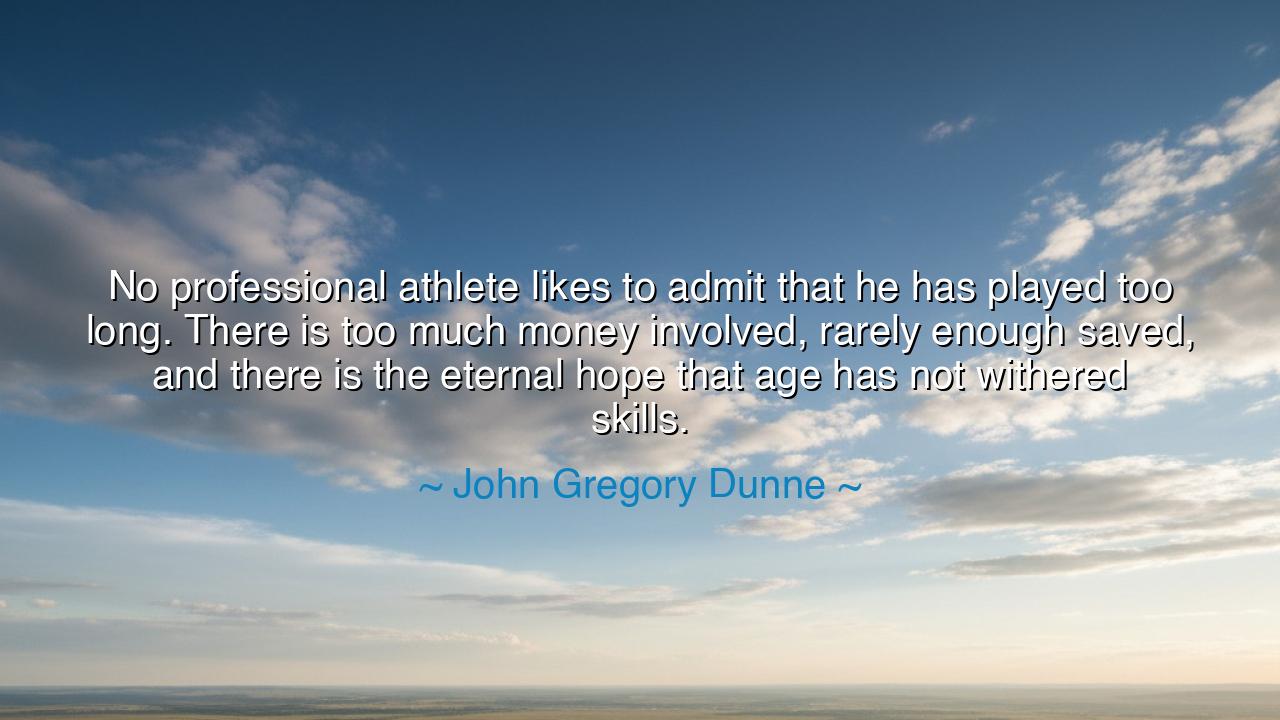
No professional athlete likes to admit that he has played too
No professional athlete likes to admit that he has played too long. There is too much money involved, rarely enough saved, and there is the eternal hope that age has not withered skills.






When John Gregory Dunne wrote, “No professional athlete likes to admit that he has played too long. There is too much money involved, rarely enough saved, and there is the eternal hope that age has not withered skills,” he captured one of the most poignant truths of the human condition — the struggle between glory and time, between the illusion of endurance and the inevitability of decline. In these words lies not merely a commentary on sport, but on life itself: that every mortal, whether warrior, artist, or athlete, must one day face the quiet reckoning that the body falters while the heart still burns.
The athlete, in Dunne’s reflection, becomes a mirror for all who have ever reached the height of their craft and feared its loss. For the athlete lives by rhythm — the rhythm of the heartbeat, the crowd, the body’s power — and when that rhythm weakens, identity itself begins to tremble. To admit that one has played too long is to confess that time, the undefeated opponent, has finally claimed victory. Yet how difficult it is to accept such defeat, especially when one’s name has been sung by thousands, when the world has rewarded strength with wealth and praise. The temptation to linger, to chase one last triumph, is the sweetest and most dangerous of all desires.
When Dunne speaks of money and hope, he reveals the dual trap that binds those who cannot let go. The wealth that once seemed endless begins to fade; the comforts of fame require maintenance; and pride whispers that another season, another game, another moment beneath the lights, might restore the old power. This is not greed, but longing — the yearning to feel alive again in the place where one was once invincible. Yet the body knows what the mind refuses to hear. Age withers skills, not by cruelty, but by law of nature; for all things that rise must one day bend before time’s hand.
Consider the story of Muhammad Ali, the great champion who once danced like wind and struck like thunder. Even as his body began to fail, his spirit could not accept surrender. He returned again and again to the ring, each time seeking the echo of his former glory. But what he found instead was the truth Dunne describes: that hope cannot preserve what nature has claimed, and that courage, in its highest form, is not in fighting forever, but in knowing when to stop. Ali’s final battles were not fought against opponents, but against his own refusal to relinquish the past. And yet, in that struggle, there was still dignity — for he showed the world that even in decline, the flame of greatness can glow with grace.
The origin of Dunne’s quote lies not only in sportswriting, but in the writer’s lifelong fascination with ambition and its cost. He saw in athletes a reflection of the artist and the dreamer — all who dedicate their lives to mastery, all who fear that stepping away will mean stepping into silence. In this way, his words transcend the field or the ring; they speak to the painter who can no longer hold the brush steady, the singer whose voice has begun to fade, the leader who stays too long upon the throne. To each, Dunne offers both compassion and warning: to cling to power past its season is to suffer twice — once in the loss, and once in the denial of it.
Yet there is also in his words a glimmer of understanding. The “eternal hope” he describes is not foolishness, but the essence of the human spirit. It is the same hope that drives us to create, to build, to fight, even knowing that all things fade. For what is life without the defiance of time? To hope that skill might outlast age is to affirm that life itself still burns within us. Thus, while the athlete who refuses to retire may fall to the ground in defeat, he also reminds us of the fierce beauty of perseverance — of the soul’s refusal to bow before the inevitable.
Let this then be the lesson: Know when to let go, but never lose the will that carried you forward. Honor your seasons — youth for its power, age for its wisdom. When your hands grow slow, use your voice; when your body fails, use your mind; when the world no longer cheers, let your own heart sing. To step away is not to surrender — it is to pass the torch, to give space for new light. For even as age withers skills, it does not wither meaning. The end of one glory is the beginning of another, and the greatest among us are those who learn to leave the stage not in despair, but in peace, knowing that their work — like their courage — endures beyond the final whistle.






AAdministratorAdministrator
Welcome, honored guests. Please leave a comment, we will respond soon